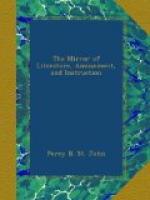stakes and chains secure from surprise on the part
of the lake. The small canton of Geneva, though
in the vicinity of the Great Alpine chain and the
mountains of the Jura, includes no mountains.
The name of the city and canton has been traced by
the etymologists to a Celtic origin;
Gen, a
sally-port or exit, and
av, a river, probably
because the Rhone here leaves the Leman lake.
The eagle on the escutcheon of the city arms indicates
its having been an
imperial city; and it is
believed the key was an adjunct of Pope Martin V.,
in the year 1418. The motto on the scroll, “Ex
tenebris lux,” appears to have existed anterior
to the
light of the Reformation. The number
of inhabitants may now be estimated at about 22,000;
but it appears, by a census in 1789, to have been
26,148. In this moral city, it is computed that
every twelfth birth is illegitimate. The number
of people engaged in clock and watch-making and jewellery,
may be safely rated at 3,000. In years favourable
to these staple manufactures 75,000 ounces of gold
are employed, which is almost equally divided between
watches and jewellery. The daily supply of silver
is about 134 ounces. Pearls form an article of
considerable value in the jewellery, and have been
rated at no less a sum that 1,200 francs daily. 70,000
watches are annually made, only one-twelfth of which
are in silver. More than fifty distinct branches
are comprised in the various departments, and each
workman, on the average, earns about three shillings
a-day.—
Mr. John Murray’s Tour.
* * * *
*
HANDEL.
Some folks eat two or three times as much as others—for
instance, our incomparable and inspired composer,
Handel, required uncommonly large and frequent supplies
of food. Among other stories told of this great
musician, it is said that whenever he dined alone
at a tavern, he always ordered “dinner for three;”
and on receiving an answer to his question—“Is
de tinner retty?”—“As soon as
the company come.”—He said, con
strepito, “Den pring up te Tinner prestissimo,
I am de gombany.”
* * * *
*
BAD WRITING.
From one of Dr. Parr’s Letters.
His letters put me in mind of tumult and anarchy;
there is sedition in every sentence; syllable has
no longer any confidence in syllable, but dissolves
its connexion as preferring an alliance with the succeeding
word. A page of his epistle looks like the floor
of a garden-house, covered with old, crooked nails,
which have just been released from a century’s
durance in a brick wall. I cannot cast my eyes
on his character without being religious. This
is the only good effect I have derived from his writings;
he brings into my mind the resurrection, and paints
the tumultuous resuscitation of awakened men with a
pencil of masterly confusion. I am fully convinced
of one thing, either that he or his pen is intoxicated
when he writes to me, for his letters seem to have
borrowed the reel of wine, and stagger from one corner
of the sheet to the other. They remind me of
Lord Chatham’s administration, lying together
heads and points in one truckle-bed.




